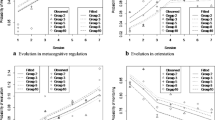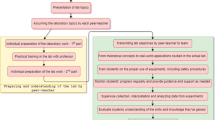Abstract
This study was conducted to examine peer tutoring models in collaborative learning of mathematical problem solving (MPS) in flipped classrooms and their effect on group achievement. Quantitative data collected include 32 videos of eight groups of students in four MPS periods that were designed based on a simplified version of Polya’s four-stage model, and their worksheets completed in each period. The video data were coded based on a framework with low-level and high-level cognitive behaviors as well as management behaviors and were analyzed using lag sequence analysis from which three types of peer tutoring models were determined: organization-oriented, cognitive-supported, and cognitive-guided. ANOVA analysis showed that the groups with cognitive-guided tutors performed significantly better than the groups guided by cognitive-supported and organization-oriented tutors, between which the performance difference did not reach a significant level. The results of this study suggest that training provided to peer tutors should focus more on how to stimulate high-level cognitive thinking skills than on organization skills.





Similar content being viewed by others
Explore related subjects
Discover the latest articles, news and stories from top researchers in related subjects.Data availability
The datasets used and/or analyzed during the current study are available from the corresponding author on reasonable request.
Change history
26 November 2022
Springer Nature’s version of this paper was updated: In PDF version, Figure 6 has been moved under “Appendix. A worksheet for group discussion” heading.
References
Al-Zahrani, A. M. (2015). From passive to active: The impact of the flipped classroom through social learning platforms on higher education students’ creative thinking. British Journal of Educational Technology, 46(6), 1133–1148. https://doi.org/10.1111/bjet.12353
Anderson, J. R. (1993). Problem Solving and Learning. American Psychologist, 48(1), 35–44. https://doi.org/10.1037/0003-066X.48.1.35
Bakeman, R., & Quera, V. (2011). Sequential Analysis and Observational Methods for the Behavioral Sciences. Cambridge University Press. https://doi.org/10.1017/CBO9781139017343
Berghmans, I., Michiels, L., Salmon, S., Dochy, F., & Struyven, K. (2014). Directive versus facilitative peer tutoring? A view on students’ appraisal, reported learning gains and experiences within two differently-tutored learning environments. Learning Environments Research, 17(3), 437–459. https://doi.org/10.1007/s10984-014-9168-8
Berghmans, I., Neckebroeck, F., Dochy, F., & Struyven, K. (2013). A typology of approaches to peer tutoring. Unraveling peer tutors’ behavioural strategies. European Journal of Psychology of Education, 28(3), 703–723. https://doi.org/10.1007/s10212-012-0136-3
Bergmann, J., & Sams, A. (2012). Flip your classroom: Reach every student in every class every day. International society for technology in education.
Bhagat, K. K., Chang, C. N., & Chang, C. Y. (2016). The impact of the flipped classroom on mathematics concept learning in high school. Journal of Educational Technology & Society, 19(3), 134–142. https://www.jstor.org/stable/jeductechsoci.19.3.134.
Bishop, J. L., & Verleger, M. A. (2013). The flipped classroom: A survey of the research. Paper presented at 2013 ASEE Annual Conference & Exposition, Atlanta, Georgia.
Capstick, S., & Fleming, H. (2004). The learning environment of peer assisted learning. In: Peer Assisted Learning Conference, Bournemouth.
Chiang, T. H. C. (2017). Analysis of learning behavior in a flipped programing classroom adopting problem-solving strategies. Interactive Learning Environments, 25(2), 189–202. https://doi.org/10.1080/10494820.2016.1276084
Chu, H. C., Chen, J. M., & Tsai, C. L. (2017). Effects of an online formative peer-tutoring approach on students’ learning behaviors, performance and cognitive load in mathematics. Interactive Learning Environments, 25(2), 203–219. https://doi.org/10.1080/10494820.2016.1276085
Colvin, J. W., & Ashman, M. (2010). Roles, risks, and benefits of peer mentoring relationships in higher education. Mentoring & Tutoring: Partnership in Learning, 18(2), 121–134. https://doi.org/10.1080/13611261003678879
Curriculum Planning and Development Division (CPDD). (2019). Mathematics syllabuses secondary one to four express course, normal (academic) course. Singapore: Ministry of Education. Retrieved May 20, 2022, from https://www.moe.gov.sg/-/media/files/secondary/syllabuses/maths/2020-express_na-maths_syllabuses.ashx?la=en&hash=E79043503E0EE64FA579D7514760663151459ED9
Curriculum Planning and Development Division (CPDD). (2020). Mathematics syllabus primary one to six. Singapore: Ministry of Education. Retrieved May 20, 2022, from https://www.moe.gov.sg/-/media/files/primary/mathematics_syllabus_primary_1_to_6.pdf
Dalkin, S., Forster, N., Hodgson, P., Lhussier, M., & Carr, S. M. (2021). Using computer assisted qualitative data analysis software (CAQDAS; NVivo) to assist in the complex process of realist theory generation, refinement and testing. International Journal of Social Research Methodology, 24(1), 123–134. https://doi.org/10.1080/13645579.2020.1803528
De Smet, M., Van Keer, H., & Valcke, M. (2008). Blending asynchronous discussion groups and peer tutoring in higher education: An exploratory study of online peer tutoring behaviour. Computers in Education, 50, 207–223. https://doi.org/10.1016/j.compedu.2006.05.001
Erbil, D. G. (2020). A review of flipped classroom and cooperative learning method within the context of Vygotsky theory. Frontiers in Psychology, 11, 1–9. https://doi.org/10.3389/fpsyg.2020.01157
Foldnes, N. (2016). The flipped classroom and cooperative learning: Evidence from a randomised experiment. Active Learning in Higher Education, 17(1), 39–49. https://doi.org/10.1177/1469787415616726
Galway, L. P., Corbett, K. K., Takaro, T. K., Tairyan, K., & Frank, E. (2014). A novel integration of online and flipped classroom instructional models in public health higher education. BMC Medical Education, 14(1), 1–9. https://doi.org/10.1186/1472-6920-14-181
Gong, D., Yang, H. H., & Cai, J. (2020). Exploring the key influencing factors on college students’ computational thinking skills through flipped-classroom instruction. International Journal of Educational Technology in Higher Education, 17, 1–13. https://doi.org/10.1186/s41239-020-00196-0
González-Gómez, D., Jeong, J. S., & Rodríguez, D. A. (2016). Performance and perception in the flipped learning model: An initial approach to evaluate the effectiveness of a new teaching methodology in a general science classroom. Journal of Science Education and Technology, 25(3), 450–459. https://doi.org/10.1007/s10956-016-9605-9
Goodrich, A. (2018). Peer mentoring and peer tutoring among K–12 students: A literature review. Update: Applications of Research in Music Education, 36(2), 13–21. https://doi.org/10.1177/8755123317708765
Hembree, R. (1992). Experiments and relational studies in problem solving: A meta-analysis. Journal for Research in Mathematics Education, 23(2), 242–273. https://doi.org/10.2307/749120
Hwang, G. J., & Chen, P. Y. (2019). Effects of a collective problem-solving promotion-based flipped classroom on students’ learning performances and interactive patterns. Interactive Learning Environments, 1–16,. https://doi.org/10.1080/10494820.2019.1568263
Jdaitawi, M. (2020). Does Flipped Learning Promote Positive Emotions in Science Education? A Comparison between Traditional and Flipped Classroom Approaches. Electronic Journal of e-Learning, 18(6), 516–524. https://doi.org/10.34190/JEL.18.6.004
Jiang, C., & Chua, B. L. (2010). Strategies for solving three fraction-related word problems on speed: A comparative study between Chinese and Singapore students. International Journal of Science and Mathematics Education, 8(1), 73–96. https://doi.org/10.1007/s10763-009-9163-1
Johnson, D. W., Johnson, R. T., & Stanne, M. B. (2000). Cooperative learning methods: A meta-analysis. Retrieved March 5, 2022, from https://www.researchgate.net/profile/David-Johnson-113/publication/220040324_Cooperative_learning_methods_A_meta-analysis/links/00b4952b39d258145c000000/Cooperative-learning-methods-A-meta-analysis.pdf
Lai, C. L., & Hwang, G. J. (2016). A self-regulated flipped classroom approach to improving students’ learning performance in a mathematics course. Computers & Education, 100, 126–140. https://doi.org/10.1016/j.compedu.2016.05.006
Madaio, M., Cassell, J., & Ogan, A. (2017). “I think you just got mixed up”: Confident peer tutors hedge to support partners’ face needs. International Journal of Computer-Supported Collaborative Learning, 12(4), 401–421. https://doi.org/10.1007/s11412-017-9266-6
McComas, J. J., Moore, T., Dahl, N., Hartman, E., Hoch, J., & Symons, F. (2009). Calculating contingencies in natural environments: Issues in the application of sequential analysis. Journal of Applied Behavior Analysis, 42(2), 413–423. https://doi.org/10.1901/jaba.2009.42-413
McLaughlin, J. E., Griffin, L. M., Esserman, D. A., Davidson, C. A., Glatt, D. M., Roth, M. T., … & Mumper, R. J. (2013). Pharmacy student engagement, performance, and perception in a flipped satellite classroom. American Journal of Pharmaceutical Education, 77(9), 1–8. https://doi.org/10.5688/ajpe779196
Munir, M. T., Baroutian, S., Young, B. R., & Carter, S. (2018). Flipped classroom with cooperative learning as a cornerstone. Education for Chemical Engineers, 23, 25–33. https://doi.org/10.1016/j.ece.2018.05.001
National Council of Teachers of Mathematics (NCTM). (2000). Principles and standards for school mathematics. Reston, VA, NCTM. Retrieved May 20, 2022, from https://www.rainierchristian.org/NCTM_principles-and-standards-for-school-mathematics.pdf
Nawaz, A., & Rehman, Z. U. (2017). Strategy of peer tutoring and students success in mathematics: An analysis. Journal of Research and Reflections in Education, 11(1), 15–30. https://ue.edu.pk/jrre/articles/1101002.pdf.
Nguyen, B., Yu, X., Japutra, A., & Chen, C. H. S. (2016). Reverse teaching: Exploring student perceptions of “flip teaching.” Active Learning in Higher Education, 17(1), 51–61. https://doi.org/10.1177/1469787415616727
Organization for Economic Co-operation and Development (OECD). (2018). PISA 2021 Mathematics Framework (first draft). Retrieved May 15, 2022, from https://www.mokykla2030.lt/wp-content/uploads/2018/12/GB-2018-4-PISA-2021-Mathematics-Framework-First-Draft.pdf
Qiang, J. (2018). Effects of digital flipped classroom teaching method integrated cooperative learning model on learning motivation and outcome. EURASIA Journal of Mathematics, Science and Technology Education, 14(6), 2213–2220. https://doi.org/10.29333/ejmste/102356
Sahin, A., Cavlazoglu, B., & Zeytuncu, Y. E. (2015). Flipping a college calculus course: A case study. Journal of Educational Technology & Society, 18(3), 142–152. https://www.jstor.org/stable/jeductechsoci.18.3.142.
Shi, Y., Ma, Y., MacLeod, J., & Yang, H. H. (2020). College students’ cognitive learning outcomes in flipped classroom instruction: A meta-analysis of the empirical literature. Journal of Computers in Education, 7(1), 79–103. https://doi.org/10.1007/s40692-019-00142-8
Sun, J. C. Y., & Wu, Y. T. (2016). Analysis of learning achievement and teacher–student interactions in flipped and conventional classrooms. International Review of Research in Open and Distributed Learning, 17(1), 79–99. https://doi.org/10.19173/irrodl.v17i1.2116
Sun, Z., Lin, C. H., Lv, K., & Song, J. (2021). Knowledge-construction behaviors in a mobile learning environment: A lag-sequential analysis of group differences. Educational Technology Research and Development, 69(2), 533–551. https://doi.org/10.1007/s11423-021-09938-x
Tong, H. (2017). 混合学习环境中协作知识建构策略研究 [Research on cooperative knowledge construction strategy in mixed learning environment](pp. 65–66). Publishing house of electronics industry.
Tucker, B. (2012). The flipped classroom. Education Next, 12(1), 82–83. https://lists.tki.org.nz/sympa/arc/ictenglish/2014-02/msg00032/ednext_20121_BTucker_flippedclassroom.pdf.
Wang, C., Fang, T., & Gu, Y. (2020). Learning performance and behavioral patterns of online collaborative learning: Impact of cognitive load and affordances of different multimedia. Computers & Education, 143, 1–14. https://doi.org/10.1016/j.compedu.2019.103683
Wang, K., & Zhu, C. (2019). MOOC-based flipped learning in higher education: Students’ participation, experience and learning performance. International Journal of Educational Technology in Higher Education, 16(1), 1–18. https://doi.org/10.1186/s41239-019-0163-0
Wang, Y. L., Cheng, Y., Wang, F., Tong, S. H., & Huang, K. B. (2016). 技术支持下的课堂教学行为观察方法探究 [Research on the observation method of classroom teaching behavior supported by technology]. Modern Educational Technology, 26(09), 39–45.
Wei, X., Cheng, I., Chen, N. S., Yang, X., Liu, Y., Dong, Y., & Zhai, X. (2020). Effect of the flipped classroom on the mathematics performance of middle school students. Educational Technology Research and Development, 68(3), 1461–1484. https://doi.org/10.1007/s11423-020-09752-x
Zheng, L., Bhagat, K. K., Zhen, Y., & Zhang, X. (2020). The Effectiveness of the Flipped Classroom on Students’ Learning Achievement and Learning Motivation: A Meta-Analysis. Journal of Educational Technology & Society, 23(1), 1–15. https://www.jstor.org/stable/26915403.
Zulaiha, Z., Bharata, H., & Dahlan, S. (2020). Developing Discovery Learning Assisted Peer Tutors to Improve Problem Solving. International Journal of Trends in Mathematics Education Research, 3(2), 106–111. https://ijtmer.saintispub.com/index.php/ijtmer/article/view/79.
Author information
Authors and Affiliations
Contributions
All authors contributed to the study conception and design. Material preparation, data collection and analysis were performed by Yangyang Li, Zengzhao Chen, Jing Fang, and Chenyang Wang. The first draft of the manuscript was written by Yangyang Li. The review and editing of the manuscript was done by Xiuling He and Chunlian Jiang. All authors read and approved the final manuscript. This research was supported by National Natural Science Foundation of China (NSFC) for the Project “A Study on the Perception and Attribution Analysis of Learners' Higher-Order Thinking Activities” (No.: 61807012). We are grateful for the support from NSFC, National Intelligent Society Governance Experiment Base (Education), and Central China Normal University. Any opinions expressed herein are those of the authors and do not necessarily represent the funds' views.
Corresponding author
Ethics declarations
Conflict of Interests
The authors declare that they have no conflict of interest.
Additional information
Publisher's Note
Springer Nature remains neutral with regard to jurisdictional claims in published maps and institutional affiliations.
Rights and permissions
Springer Nature or its licensor (e.g. a society or other partner) holds exclusive rights to this article under a publishing agreement with the author(s) or other rightsholder(s); author self-archiving of the accepted manuscript version of this article is solely governed by the terms of such publishing agreement and applicable law.
About this article
Cite this article
Li, Y., Jiang, C., Chen, Z. et al. Peer tutoring models in collaborative learning of mathematical problem solving and their effect on group achievement. Educ Inf Technol 28, 6595–6618 (2023). https://doi.org/10.1007/s10639-022-11429-2
Received:
Accepted:
Published:
Issue Date:
DOI: https://doi.org/10.1007/s10639-022-11429-2





